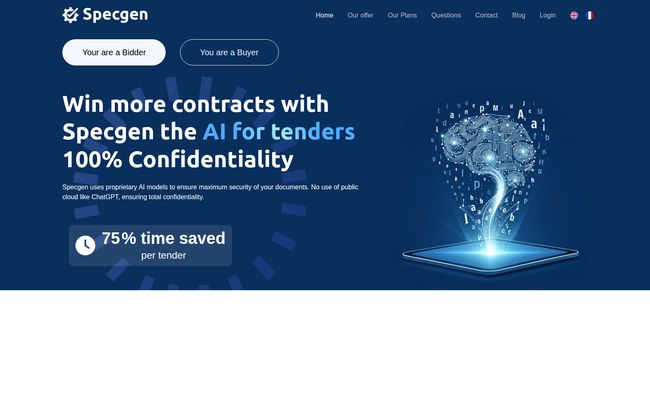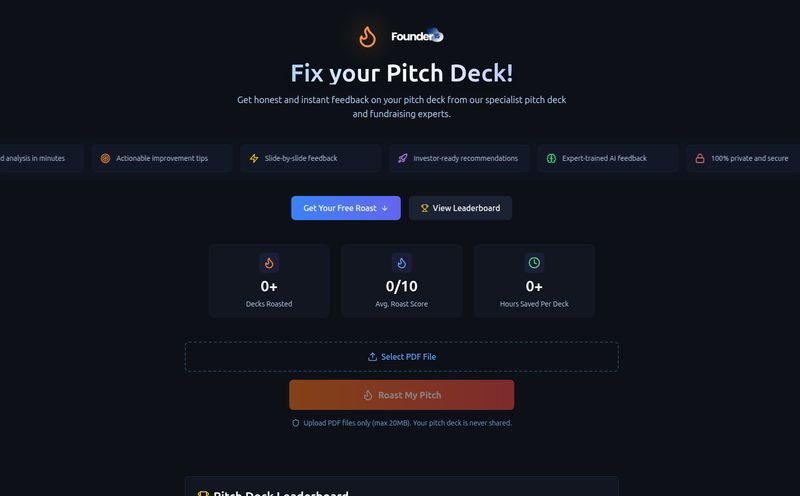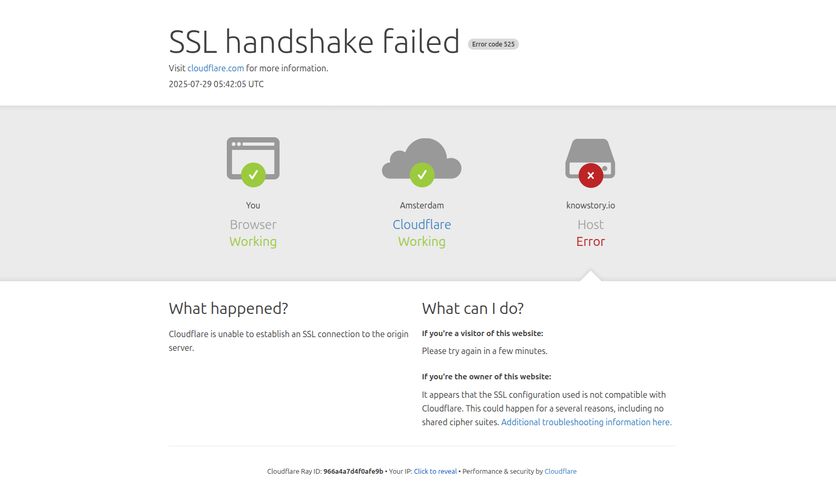If you're in the business of winning contracts, you know the grind. The appel d'offres, the RFP, the call for tenders... whatever you call it, it often means one thing: long nights, copious amounts of coffee, and a small part of your soul dying with every copy-paste job from a previous proposal. I’ve lost count of the weekends sacrificed to the RFP gods, just trying to piece together a coherent, compliant, and—dare I say—winning bid.
For years, we've done it the hard way. It's a rite of passage. But with the AI explosion, everyone's wondering if there's a better way. We've all seen tools that promise to write everything for you, but there's always that nagging voice in the back of your head: "Where is my data going?"
That's the question that led me to Specgen. It's another AI platform promising to ease the tender response burden, but with one major, gigantic difference that made me sit up and pay attention: a promise of 100% confidentiality. No, this isn't just another ChatGPT wrapper. I decided to take a proper look, and what I found is... well, it's pretty interesting.
What Exactly is Specgen? (And Why Should You Care?)
At its core, Specgen is an AI-powered assistant built specifically for the tender response process. Think of it as a specialist, not a generalist. It’s designed to read those monstrously long tender documents, figure out what the buyer actually wants, and help you build a response without you having to manually sift through hundreds of pages of requirements. Their big claim? Saving you up to 75% of the time you’d normally spend on a tender.

Visit Specgen
But here’s the part that really matters, especially for anyone in tech, finance, government contracting, or any field where your proposal data is your secret sauce. Specgen uses its own proprietary AI models.
This is not a small detail. It’s the entire ballgame. Using a public AI like ChatGPT to analyze a sensitive RFP is like discussing your company's secret acquisition strategy on a crowded public bus. You have no idea who is listening or how that information will be used later. Specgen keeps it all in-house (or even on-premises, if you go for that option), which means your confidential data, your pricing, and your technical solutions stay yours. For me, that's a massive sigh of relief.
A Walkthrough of The Specgen Workflow
So, how does it actually work? It's not just a magic button (thankfully, as those rarely work). The process they've laid out is quite logical and follows the natural, albeit painful, steps of responding to a bid.
The Initial Grind: Ingesting the Tender Beast
It all starts, as it must, with the tender document itself. You upload the PDFs, Word docs, or whatever else the buyer has thrown at you. Specgen's AI then gets to work, acting like a super-powered paralegal. It doesn't just read; it analyzes. It pulls out all the specific requirements, deadlines, and criteria. What I found particularly cool is its ability to spot inconsistencies in the buyer's documents—something that can save a ton of headaches and clarification requests down the line.
Feeding Your Brain: Building the Knowledge Base
This is probably the most important step for getting real value. The AI is only as smart as the information it has access to. Specgen allows you to upload your own internal knowledge base: past proposals, technical documentation, security policies, case studies, you name it. This is how the AI learns your voice, your products, and your standard answers. You’re essentially training a personalized bid assistant that knows your company inside and out.
The Magic Moment: AI-Powered Response Generation
Once the AI understands the tender's requirements and your company's knowledge, it starts connecting the dots. Features like BidMatching run a compliance analysis, showing you where you meet the requirements and where there might be gaps. Then, tools like BidWord and BidExcel start generating draft responses directly in the formats you actually need to submit. No more awkward copying and pasting from a chatbot window. It's a collaborative tool, where the AI provides the first draft, and your team comes in to refine, strategize and add that essential human touch.
The Elephant in the Room: Confidentiality in the AI Age
I want to circle back to this because I can't stress it enough. For years, the main barrier to using AI in serious business processes has been security. We've all heard the horror stories of employees pasting sensitive code into public AI tools, only for it to pop up elsewhere. When you're dealing with a multi-million dollar contract bid, you simply cannot take that risk.
"Specgen uses proprietary AI models to ensure maximum security of your documents. No use of public cloud like ChatGPT, ensuring total confidentiality."
This statement from their site is the foundation of their whole offering. By developing their own models and offering an on-premises hosting option, they've directly addressed the number one fear of every CTO and legal department. It moves the conversation from "Can we risk this?" to "How can we use this to our advantage?" It's a fundamental shift in thinking for a tool in this space.
So, How Much Does This Magic Cost? A Look at Specgen's Pricing
Alright, let's talk money. AI this specialized and secure doesn't come free. Specgen operates on a subscription and credit-based model, which seems fair for this kind of B2B service. It lets you scale your usage based on how many tenders you're actually responding to.
Here’s a quick breakdown of their plans:
| Plan | Monthly Cost | What You Get |
|---|---|---|
| Starter | €99 + €20/user | 100 credits per month, ideal for about 2 tenders. Credits roll over. |
| Team | €399 + €20/user | 500 credits per month, good for about 10 tenders. Credits roll over. |
| Premium | €990 + €20/user | 2000 credits per month, built for 20+ large tenders. Credits roll over. |
Note: They also offer a Free Trial with 50 credits, so you can test it on a real (but perhaps smaller) tender before committing.
Now, some might see those prices and pause. But let's put it in perspective. How much does it cost, in terms of salary and hours, for your senior sales engineer, a proposal manager, and a subject matter expert to spend a week locked in a room working on a single bid? I guarantee it's more than €399. When you frame it as an investment in efficiency and winning more deals, teh math starts to make a lot of sense.
The Good, The Bad, and The AI-Assisted
No tool is perfect. As a seasoned pro, I’m always skeptical. So here’s my balanced take.
The Good Stuff (Why I'm Excited)
The confidentiality is, without a doubt, the number one reason to consider Specgen. It's a true differentiator. The time-saving potential is massive, freeing up your best people to focus on strategy instead of administrative drudgery. The collaborative workspace is also a huge plus, helping to end the chaos of managing multiple versions of a document via email. And for companies like mine that operate in both North America and Europe, the bilingual French/English support is a genuinely useful feature, not just an afterthought.
Things to Keep in Mind (The Reality Check)
First, it's a paid subscription service, so you have to budget for it. The credit system, while flexible, means you'll need to monitor your usage so you don't run out mid-proposal. But the most important thing to remember is this: AI is a copilot, not the pilot. You can’t just hit a button and expect a perfect, submission-ready proposal to pop out. The responses it generates will still need human review, customization, and that final strategic polish. It gets you 75% of the way there, but that last 25% is where your team’s expertise really shines and wins the contract.
Frequently Asked Questions About Specgen
- 1. Is Specgen just another wrapper for ChatGPT?
- Absolutely not. This is its main strength. Specgen uses its own proprietary AI models, developed in-house, to ensure that your sensitive bid data is never shared or used to train public models. They also offer on-premises hosting for complete data control.
- 2. What kind of tender documents can I use with Specgen?
- It's designed to handle a variety of common formats you receive from buyers, including PDF, Word, and Excel. The goal is to ingest the tender package as-is and begin the analysis.
- 3. How does the credit system work?
- Think of credits as the currency for AI processing. A certain number of credits are used for analyzing a tender and generating the response. The plans are designed to give you a rough idea of how many tenders you can process per month, and unused credits conveniently roll over.
- 4. Is my company's data really safe?
- Based on their model, yes. The combination of proprietary AI and the option for on-premises deployment provides a much higher level of security than any tool relying on public AI services. This is a core feature of their platform.
- 5. Will this tool replace my bid management team?
- No, it empowers them. It automates the most time-consuming, repetitive parts of the job. This frees up your bid team to act as strategists, reviewers, and finishers—focusing on personalizing the bid, strengthening the value proposition, and ensuring the final submission is flawless.
- 6. Can I try it before I buy?
- Yes, Specgen offers a free trial that comes with 50 credits, which should be enough to test its capabilities on a real-world project and see if it fits your team's workflow.
My Final Verdict: Is Specgen Worth the Investment?
After digging into Specgen, I have to say I'm impressed. It's not just another company jumping on the AI bandwagon. They've thoughtfully addressed the biggest pain points and fears associated with using AI for high-stakes business documents. It’s a tool built with a clear understanding of the tender response process and, most importantly, a respect for data confidentiality.
If your team is constantly drowning in RFP paperwork and you operate in an industry where data security is non-negotiable, Specgen isn't just a nice-to-have; it could be a powerful competitive advantage. It’s about shifting your team's energy from tedious grunt work to high-value strategic thinking. And in the cutthroat world of contract bidding, that might be all the edge you need to win.



